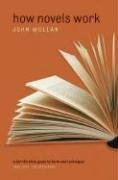Search -
How Novels Work
How Novels Work
Author:
Never has contemporary fiction been more widely discussed and passionately analysed; recent years have seen a huge growth in the number of reading groups and in the interest of a non-academic readership in the discussion of how novels work. Drawing on his weekly Guardian column, 'Elements of Fiction', John Mullan examines novels mostly of the la... more »
Author:
Never has contemporary fiction been more widely discussed and passionately analysed; recent years have seen a huge growth in the number of reading groups and in the interest of a non-academic readership in the discussion of how novels work. Drawing on his weekly Guardian column, 'Elements of Fiction', John Mullan examines novels mostly of the la... more »
ISBN-13: 9780199281787
ISBN-10: 0199281785
Publication Date: 5/15/2008
Pages: 368
Rating: ?
ISBN-10: 0199281785
Publication Date: 5/15/2008
Pages: 368
Rating: ?
0 stars, based on 0 rating
Publisher: Oxford University Press, USA
Book Type: Paperback
Other Versions: Hardcover
Members Wishing: 2
Reviews: Amazon | Write a Review
Book Type: Paperback
Other Versions: Hardcover
Members Wishing: 2
Reviews: Amazon | Write a Review
Genres:
- Literature & Fiction >> Books & Reading
- Literature & Fiction >> History & Criticism >> Criticism & Theory
- Literature & Fiction >> British & Irish >> 20th Century




